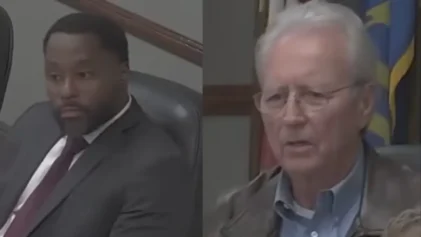A Utah sheriff’s deputy has been reprimanded by authorities for twirling a lasso while searching for a Black suspect. Social justice activists say the act and conversation that accompanied it were culturally insensitive and ignorant of painful historic and racial overtones.
On Thursday, Oct. 25, the Utah Highway Patrol said the actions of deputy Amanda Edwards, who was twirling her lasso and trooper Brandan Custer, who made a joke about helping her catch a suspect with the rope, “does not represent the practices” of the agency, according to KSL-TV.
Bodycam footage from that day, Sunday, July 10, reminded the officers of their behavior, as Custer forgot his statements.
Patrol Sgt. Cameron Roden said that while he did not remember making the comment, he recognized the voice in the video as his own. Administrators at the Utah Department of Public Safety investigated the case and decided no disciplinary action was needed for his part in the incident.
He was, however, counseled by Highway Patrol major Beau Mason on “maintaining professional conduct at all times to demonstrate our values of integrity and public trust.”
For Edwards, it was a different story.
The Grand County Sheriff’s deputy was assisting Moab police look for a man who allegedly ran from them.
As Edwards was looking for an African-American suspect, she started twirling the rope. The video shows as she gets out of her vehicle, she goes to the back and pulls out her lasso, which is considered a utility tool. As she walks, swinging her arm with the rolled-up rope, she can be heard whistling.
Someone asks her, “Are you going to lasso him?” She responds, “That was my plan. It’s better than running right?”
The more she walks around, looking for the suspect, multiple people inquire about what she plans to do with the rope. One person asked, “Are you going to rope him?” Edwards quips, “I might. It’s better than running or a Taser right? Less painful.”
The video shows the deputy, who never finds the man, twirling or carrying the rope, and telling her colleagues and regular members of the public she may use the weapon to detain the suspect if she finds him. She does this for almost 35 minutes.
Deputy Jamison Wiggins tells his colleague, “That’s gonna look really bad if you use it,” he warns. But she shrugs him off and says, “It’s better than a Taser.”
As she whistles, she yells out to a colleague, “I’ve been waiting for this moment for quite some time.”
Then Edwards bumps into a Utah Highway Patrol Trooper Cluster, who said upon seeing her lasso, “I will corner him so you can rope him.”
“Appreciate it. We just need to get him on the run, like, ‘run, now,’ ” Edwards replies with satisfaction that someone is seeming to entertain her plan, whistling again as she walks away.
When Edwards returned to her patrol vehicle, she was shocked at the attention she received. The video shows her saying, “Dude, So many people took pictures of me with my rope. I’m like ‘Oh, please, don’t say bad things.’ ”
One of those photos was posted in The Moab Sun News, a local newspaper, with the caption revealing the deputy’s name; and an internal investigation was started by law enforcement.
Community leaders are calling for more intentional diversity training and some accountability for their offensive actions.
Jeanetta Williams, president of the Salt Lake chapter of the NAACP, said the video of the deputy was “unbelievable,” adding, “You would think it was the Wild, Wild, West.”
Rae Duckworth and Mario Mathis of Black Lives Matter Utah also were shocked.
“So, she knew she was looking for a Black man, and she gets a rope,” Mathis says in disbelief, reflecting on the racial connections between ropes, African-Americans and law enforcement.
Duckworth said the suspect, should he have seen Edward, could have likened her to a “slave patroller,” a historic agent of law enforcement hired with the express assignment to capture self-liberated Black people and return them to the bondage of slavery.
“We’re in 2022, and that’s a comfortable slave patroller in my state,” the activist said before she started crying.
Duckworth, Mathis and Williams say the footage rips the scab of America’s ugliest injury, slavery.
A visibly disturbed Williams said, “We’ve had hanging before by police and then they see somebody with a rope …”
Not everyone was as upset as the three. Sara Melnicoff, who works with the homeless population, says she knew the man and that he was a part of the unsheltered population. Melnicoff called him “pretty harmless,” but said he has serious mental health issues. She also said she helped him get a bus ticket to leave town. After that, he never came back.
She also said she worked closely with Edwards, saying what a fine officer she was and how well she treated everyone. According to Melnicoff, when the community heard about the investigation into Edwards’ conduct, they rallied around her, even reaching out to the sheriff.
Melnicoff said she did think about it that way at first. Now, she can see the racial implications of her friend’s actions. The community stakeholder said, “It’s a huge learning moment.”
Williams, who also is a 20-year member of the West Valley City police civilian review board, believes it can be a learning moment should the sheriff department institute cultural and sensitivity training that supplements the curriculum taught to cadets in Utah’s police academy.
With a population of around 9,663 people, Moab has a demographic that is 89 percent white and 1.1 percent Black, according to 2020 U.S.Census reports.
In reference to this incident, Edwards said she did not believe she would ever meet up with the man and said she was “joking” when she made her comments.
Duckworth said she did not believe this was funny. Mathis said, “She’s not joking. She has a real rope in her hand. Rope and Black people. What do you think is the first thing that comes to mind … is lynching. Hanging Black people from trees.”
“I don’t think that it’s joking,” Grand County sheriff Steven White said, sternly. “To me, it comes back to a matter of professionalism.”
He continued, “That was not an approved apprehension tool. It shouldn’t have been brought out.”
The sheriff said Edwards was disciplined, but did not provide specifics. He also said their investigation confirmed race was not a factor in her decision to use the rope. White also indicated that “[Edwards] owned up to that mistake.”
White would not release any records related to Edwards’ disciplinary record and did not contact outside law enforcement to review the footage. The entire investigation was conducted by his office.


